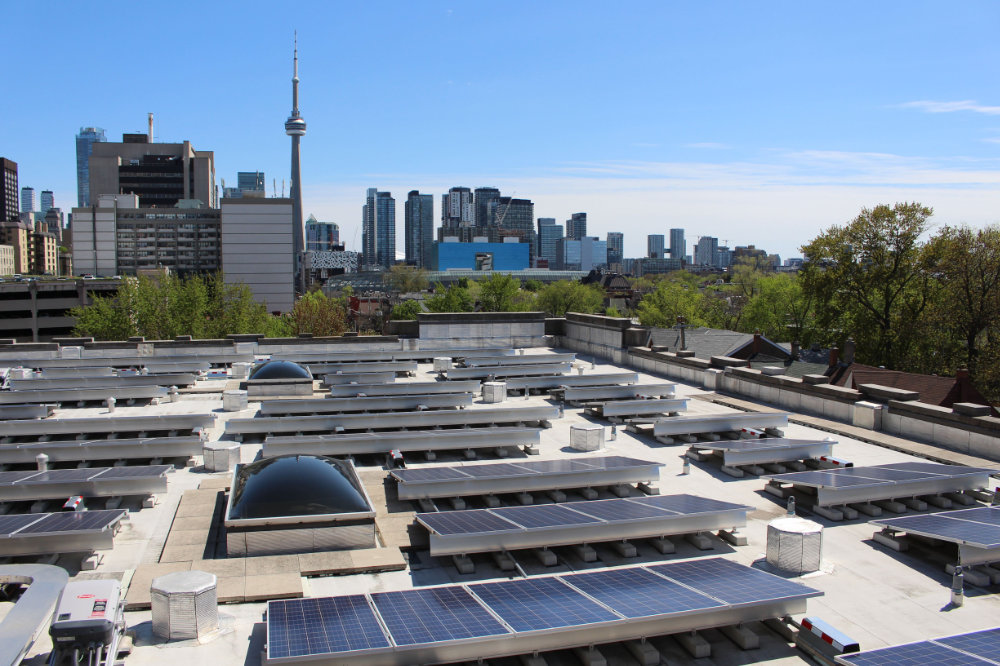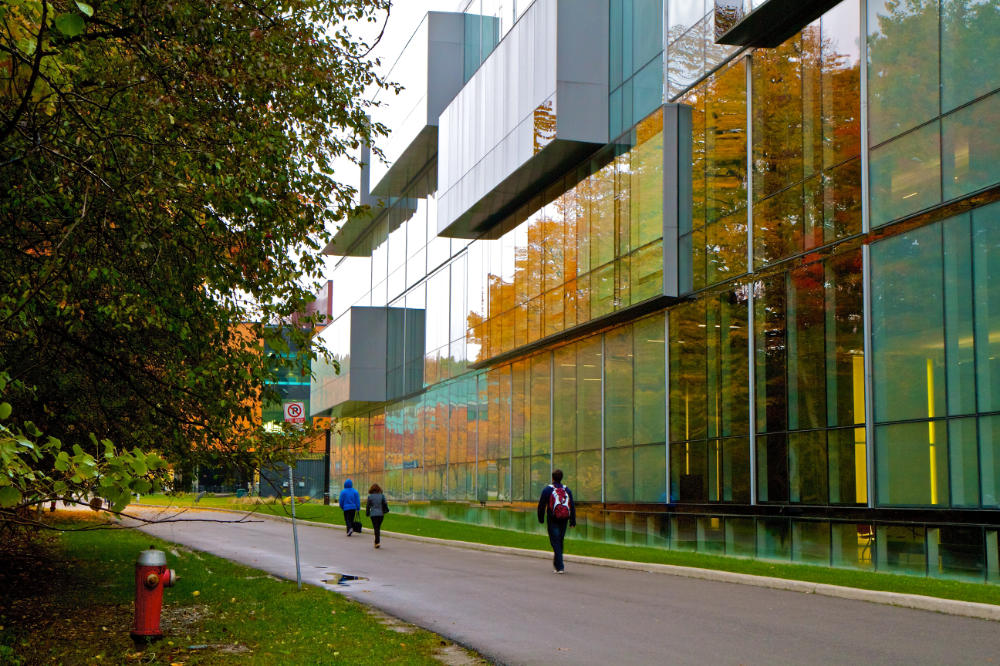Supported Research
Climate Positive Energy funds research in sustainable energy across disciplines at the University of Toronto. Learn more about our funded projects and researchers through the projects below.
Research Projects
Behaviour
 Ascertaining the Hope of the Anishinaabe on Environmentalism and Conservationism
Ascertaining the Hope of the Anishinaabe on Environmentalism and Conservationism Decarbonizing the UofT community: How can we enable more sustainable and equitable personal choices across the three campuses?
Decarbonizing the UofT community: How can we enable more sustainable and equitable personal choices across the three campuses? Understanding Community-centred Perspectives and lived experiences in energy transition norms
Understanding Community-centred Perspectives and lived experiences in energy transition norms Youth-led Leadership in Climate Action – Partnership with City of Toronto
Youth-led Leadership in Climate Action – Partnership with City of Toronto
Buildings
 A Fine-Grained Dataset of Material Usage in Buildings to Increase Material Efficiency
A Fine-Grained Dataset of Material Usage in Buildings to Increase Material Efficiency Building More with Less: Pathways to build the infrastructure of the future within allowable embodied GHG budgets
Building More with Less: Pathways to build the infrastructure of the future within allowable embodied GHG budgets Embodied carbon intensity reduction of single-family dwellings in the City of Toronto
Embodied carbon intensity reduction of single-family dwellings in the City of Toronto Exploring Gaps and Requirements to Support More Just Engagement with Energy Modelling for Building Retrofits
Exploring Gaps and Requirements to Support More Just Engagement with Energy Modelling for Building Retrofits Grid-Interactive Smart Campus Buildings
Grid-Interactive Smart Campus Buildings Material Intensity of Building and Embodied GHG Emissions
Material Intensity of Building and Embodied GHG Emissions School of the Environment Photovoice Research
School of the Environment Photovoice Research Tracking the impacts of climate mitigation and energy transition actions on health in Toronto among vulnerable communities
Tracking the impacts of climate mitigation and energy transition actions on health in Toronto among vulnerable communities
Carbon Capture, Utilization & Storage
 Assessing opportunities in carbon capture and conversion to fuel technologies for empowering Indigenous-led clean energy projects and Northern utilities
Assessing opportunities in carbon capture and conversion to fuel technologies for empowering Indigenous-led clean energy projects and Northern utilities Developing a carbon capturing combustor-reactor powered by hydrogen generated in-situ from thermally coupled pyrolysis of natural gas
Developing a carbon capturing combustor-reactor powered by hydrogen generated in-situ from thermally coupled pyrolysis of natural gas Developing a Self-decarbonizing Combustor to Reduce CO2 Emissions
Developing a Self-decarbonizing Combustor to Reduce CO2 Emissions Guanidines as a Motif for Carbon Capture and Activation
Guanidines as a Motif for Carbon Capture and Activation Machine learning-enabled discovery of redox agents for electrochemical capture and concentration of CO2
Machine learning-enabled discovery of redox agents for electrochemical capture and concentration of CO2
Climate Economics
Climate Politics
 Accounting for the Extractivist Footprint of EVs: A Comparative Analysis of Local and Transnational ESG Standards Governing Lithium Production
Accounting for the Extractivist Footprint of EVs: A Comparative Analysis of Local and Transnational ESG Standards Governing Lithium Production Assessing the Solutions: Understanding impact assessment frameworks for Nature-based Solutions in Canada
Assessing the Solutions: Understanding impact assessment frameworks for Nature-based Solutions in Canada Beyond technological fixes – Fostering justice and equity in the transition to sustainable heating technologies in Canada (FITTING)
Beyond technological fixes – Fostering justice and equity in the transition to sustainable heating technologies in Canada (FITTING) Captured: Green Innovation, Social Values, and the Quest to Solve Climate Change, 1996-2021
Captured: Green Innovation, Social Values, and the Quest to Solve Climate Change, 1996-2021 Community-Based Organizations (CBOs) and Solar Photovoltaic (PV) Deployment
Community-Based Organizations (CBOs) and Solar Photovoltaic (PV) Deployment Designing Toward Sustainable and Equitable Agricultural Labor and Technologies
Designing Toward Sustainable and Equitable Agricultural Labor and Technologies Exploring equity in the climate action plans of the world’s “most sustainable” cities
Exploring equity in the climate action plans of the world’s “most sustainable” cities Grounding models: co-creating agent-based models to understand TransformTO goals
Grounding models: co-creating agent-based models to understand TransformTO goals Interrogating the Intersection of Colonialism, Capitalism, and Speciesism in Hindering Climate-Positive Energy Systems: A Critical Analysis through Sport and Animal Studies
Interrogating the Intersection of Colonialism, Capitalism, and Speciesism in Hindering Climate-Positive Energy Systems: A Critical Analysis through Sport and Animal Studies Just Mitigation?: Applying a climate justice approach to the implementation of mitigation policies in growing cities in Southeast Asia
Just Mitigation?: Applying a climate justice approach to the implementation of mitigation policies in growing cities in Southeast Asia Performance matters: Augmenting analyses of residential solar PV deployment and distribution with system performance data
Performance matters: Augmenting analyses of residential solar PV deployment and distribution with system performance data Plastic Peace: Assessing Agency in Developing Countries for a Pioneering Plastics Treaty
Plastic Peace: Assessing Agency in Developing Countries for a Pioneering Plastics Treaty The dynamics of lithium mining for a clean energy transition in Québec, Canada
The dynamics of lithium mining for a clean energy transition in Québec, Canada The political economy of convertible firms: Electric utilities and automakers in climate politics
The political economy of convertible firms: Electric utilities and automakers in climate politics
Energy
Forests
Hydrogen Fuel Cells
Materials
 Accelerated discovery of battery materials using ML-predicted projected density of states
Accelerated discovery of battery materials using ML-predicted projected density of states Active, fluidic windows for energy savings, load management and enhanced daylighting on U of T campus
Active, fluidic windows for energy savings, load management and enhanced daylighting on U of T campus AI Driven Catalyst Research
AI Driven Catalyst Research Catalytic Synthesis of Sustainable Chemicals: Reaction Exploration
Catalytic Synthesis of Sustainable Chemicals: Reaction Exploration Chemical Recycling of Consumer Plastics by Visible Light-Mediated Photocatalytic Process
Chemical Recycling of Consumer Plastics by Visible Light-Mediated Photocatalytic Process Converting Tea Waste to Electrodes for Energy Storage
Converting Tea Waste to Electrodes for Energy Storage Fertilizer and Plastics Precursor, Greenhouse Gas-Free, using Air and Sunlight
Fertilizer and Plastics Precursor, Greenhouse Gas-Free, using Air and Sunlight Harnessing More Solar Energy with Green Chemistry: The Sustainable Design of Hybrid Organic Materials for Next-Generation Organic Solar Cells
Harnessing More Solar Energy with Green Chemistry: The Sustainable Design of Hybrid Organic Materials for Next-Generation Organic Solar Cells Manufacturing Unnatural and D-Amino Acids using Green and Recyclable Chemistry
Manufacturing Unnatural and D-Amino Acids using Green and Recyclable Chemistry Photothermal ice nucleation inhibiting coating for improved clean energy equity
Photothermal ice nucleation inhibiting coating for improved clean energy equity Pi-conjugated polymers with radical pendant group for battery usage
Pi-conjugated polymers with radical pendant group for battery usage Redox-active polyethers for solution-based electrochemical carbon capture
Redox-active polyethers for solution-based electrochemical carbon capture Release of Microplastic Fibres From Washing Textiles
Release of Microplastic Fibres From Washing Textiles
Measurements & Modelling
 Application of the University of Toronto Climate Downscaling Workflow to the Just Energy Transition
Application of the University of Toronto Climate Downscaling Workflow to the Just Energy Transition Dynamic capacity of carbon fixation by urban vegetation under global warming scenarios
Dynamic capacity of carbon fixation by urban vegetation under global warming scenarios Estimation of the city’s vegetation to the carbon footprint
Estimation of the city’s vegetation to the carbon footprint GHG, cost and material use implications of decarbonizing heavy-duty trucks with zero-emission technologies
GHG, cost and material use implications of decarbonizing heavy-duty trucks with zero-emission technologies Impacts of physical attributes of paved surfaces for the urban energy demand: A case study for the City of Toronto
Impacts of physical attributes of paved surfaces for the urban energy demand: A case study for the City of Toronto Mobile Methane Measurements Across Toronto
Mobile Methane Measurements Across Toronto Modelling electric and hydrogen fuel cell pathways for Canadian light-duty vehicles to meet climate targets
Modelling electric and hydrogen fuel cell pathways for Canadian light-duty vehicles to meet climate targets Monitoring Methane Enhancement Ratios over Cities
Monitoring Methane Enhancement Ratios over Cities Scope 3 Emissions: A Conceptual Accounting Framework for Post-Secondary Institutions and Measurement of Selected Categories of Emissions
Scope 3 Emissions: A Conceptual Accounting Framework for Post-Secondary Institutions and Measurement of Selected Categories of Emissions The Holiday Effect: A Natural Experiment to Understand Anthropogenic Emission Sources and Reduction
The Holiday Effect: A Natural Experiment to Understand Anthropogenic Emission Sources and Reduction Understanding the Social Benefits of Urban Trees
Understanding the Social Benefits of Urban Trees Validating Satellite Measurements of Urban Emissions
Validating Satellite Measurements of Urban Emissions
Mobility & Transportation
Training
Waste & Circular Economy
 Artificially Evolving Bacteria to Consume Recyclable Feedstocks
Artificially Evolving Bacteria to Consume Recyclable Feedstocks Catalytic Depolymerization of Polystyrene Waste into Valuable Phenolic Products using Visible-light Driven Photocatalysis and Green Solvents
Catalytic Depolymerization of Polystyrene Waste into Valuable Phenolic Products using Visible-light Driven Photocatalysis and Green Solvents Complete Biosynthesis of Adipic Acid in Pseudomonas Putida
Complete Biosynthesis of Adipic Acid in Pseudomonas Putida Kinetic Consequences of the Intercorrelations between Acid and Redox Sites on Metal Oxides for Drop-in Oxygenates Synthesis from Sustainable Bio-based Methanol
Kinetic Consequences of the Intercorrelations between Acid and Redox Sites on Metal Oxides for Drop-in Oxygenates Synthesis from Sustainable Bio-based Methanol Prefiguring an Equitable Net-Zero Future by Mitigating Food Waste and Enhancing Food Security
Prefiguring an Equitable Net-Zero Future by Mitigating Food Waste and Enhancing Food Security Sustainable carbon-negative biomining-coupled biofuel production using genetic engineered Acidithiobacillus ferridurans
Sustainable carbon-negative biomining-coupled biofuel production using genetic engineered Acidithiobacillus ferridurans Transport of Medium Chain Fatty Acids through Rubbery Polymer Film
Transport of Medium Chain Fatty Acids through Rubbery Polymer Film














































































